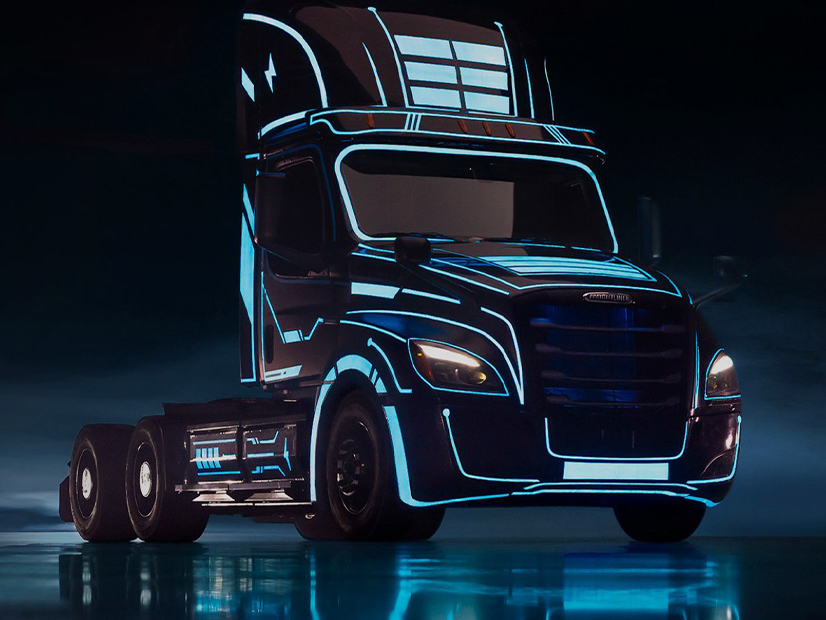
NextEra Energy Resources (NYSE:NEE), Daimler Truck North America and BlackRock Renewable Power (NYSE:BLK) this week announced a joint venture (JV) to build and operate a national network of electric charging and hydrogen refueling stations for commercial vehicles.
With initial funding of about $650 million, with equal contributions from each of the companies, the JV intends to begin building a network of refueling stations in 2023 along “critical freight routes” on the East and West coasts. Construction of a Texas network is planned to begin in 2026.
The initial focus will be building charging stations for medium- and heavy-duty electric trucks and later refueling stations for heavy-duty trucks powered with electricity produced by hydrogen fuel cells.
“Our joint investment will act as a catalyst to make a carbon-neutral trucking industry a reality,” said John O’Leary, president and CEO of Daimler Truck North America. “This project is a critical step toward developing a sustainable ZEV [zero-emission vehicle] ecosystem across North America, and we look forward to including additional partners as it progresses.”
The network of refueling and charging stations will be open to the public as well as the trucking industry.
NextEra Energy Resources CEO John Ketchum said he expected the JV “to accelerate the transformation of the transportation sector and make future investments in electrification upgrades, charging stations and renewables.”
“This collaboration builds on our market-leading eIQ Mobility software platform for quantifying the value and timing of fleet conversions and our decarbonization-as-a-service platform that help fleets execute on their plans to transition to zero-emission, electric and hydrogen vehicles.”
David Giordano, global head of BlackRock’s Renewable Power Group, said the JV’s objective of decarbonizing transportation “will be a critical societal focus for the next decade” and “highly complementary to our renewable power generation investment strategy.”
The announcement came less than 10 days after the Biden administration’s Joint Office of Energy and Transportation announced it would release guidance this month to help states to apply for federal grants to help pay for EV charging networks. (See DOE-DOT Joint Office to Begin Rollout of EV Infrastructure Funds.)
The bipartisan Infrastructure and Investment Jobs Act earmarked $7.5 billion to support the development of a national EV charging network. The administration set a goal that 50% of new cars sold in 2030 be electric or hybrid electric.
Federal support of technologies to improve truck performance preceded the passage of the infrastructure bill.
In April 2021, the Department of Energy announced the third funding cycle in its 12-year Super Truck initiative, this funding specifically targeting improvements in electric drive systems. (See DOE Offers $100M for Electrification of Heavy Trucks.)
There has also been an effort by the trucking industry itself to move toward electric drive systems.
The North American Council for Freight Efficiency, a collaboration of trucking fleets, truck makers and tech suppliers created in 2009 with the Rocky Mountain Institute, followed 13 trucking companies testing pre-production electric drive vehicles in 2021, from delivery vans operating in cities to 18-wheelers on prescribed long-distance routes.
Among the findings was that mileage of electric trucks depended on the skill of the driver. (See Electric Truck Efficiency Depends on the Driver.) In one of several webinars, NACFE also heard from analysts who noted that the Chinese trucking industry is a global leader in the use of electric drive systems. (See US Way Behind China in Deploying Heavy-Duty EVs.)
Electric utilities appear to be committed to the buildout of an EV charging network. The Edison Electric Institute and more than 50 electric utilities in December announced the creation of a national coalition to facilitate building charging stations along the nation’s interstate highways. (See National Electric Highway Coalition to Build Fast-charging Stations.)
Still, the development of EV charging stations hinges on state utility commissions allowing utilities to build the necessary infrastructure to support the new demand on local distribution grids. Fast charging a Class 8 heavy-duty truck can require 3 MWh of power, necessitating expensive upgrades to the distribution system.
Daimler is expecting to begin production of two electric trucks this year: the heavy-duty Freightliner “eCascadia” and medium duty “eM2.” Two other major truck makers, Volvo and Kenworth, are also preparing to market heavy- and medium-duty electric trucks.


